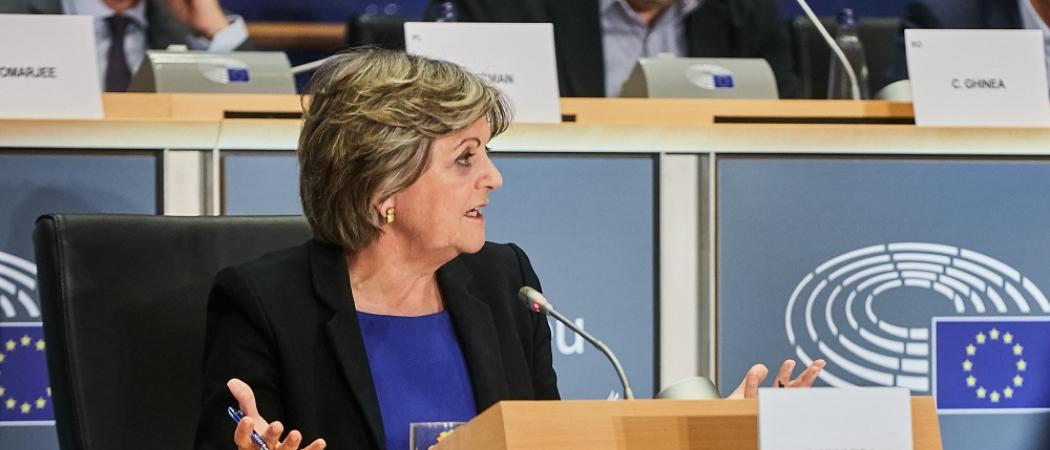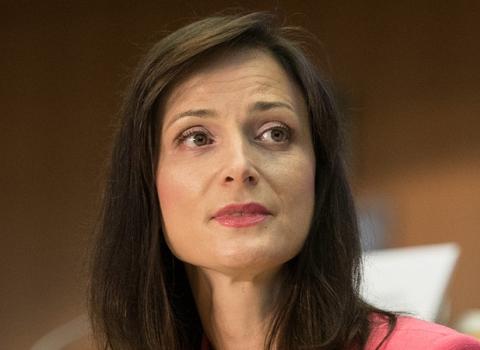EU regional commissioner says Europe should not ‘destroy path we’re on’, but accepts demand for future funding will be dominated by post-pandemic rebuilding

Commissioner Elisa Ferreira. Photo: European Commission
The EU commissioner who oversees regional funds says Europe should not “destroy [the] path we’re on” towards green and digital growth, but accepts that criteria for issuing cohesion funding in the coming years will be dominated by the huge rebuilding task that will follow the COVID-19 pandemic.
“We need a more digital and green economy. It makes more sense than ever now,” Elisa Ferreira said on Tuesday in a web conference hosted by the Bruegel think tank in Brussels.
But the Portuguese commissioner acknowledged that the needs created by the crisis are diverse and great across Europe, and promised funding flexibility for member states to meet demand.
“There is a huge amount of activities that have to be stepped up,” she said. “Without even seeing the data I imagine [support for] tourist regions will need to be stepped up. Cultural activities are suffering immensely.”
“You might not have a single casualty, but a huge economic hit – if you’re in regions that export raw materials [or] regions that depend on international transport, you are bound to have a massive crisis,” she said.
EU leaders will hold a videoconference on Thursday to try hammer out the EU budget for the next seven years – a period which will now be dominated by post-coronavirus recovery investment.
Cohesion funding, which aims to reduce economic and social disparities across the bloc, is one of the biggest slices of the budget, slated to be worth more than €300 billion in the 2021-2027 cycle. This money is the main source of public investment for many of the continent’s poorer regions in the south and east.
Before the pandemic, the plan in Brussels was to shift EU money away from cohesion subsidies toward other priorities, such as science and defence-related research.
The European Commission’s original spending proposal for 2021-2027 – now undergoing a hasty re-write – suggested cutting cohesion funding by 10 per cent. Countries including Croatia, Cyprus, the Czech Republic, Estonia, Hungary and Romania argue for a budget deal to maintain spending for cohesion at the same level as in the 2014-2020 budget.
Ferreira, who is the former vice governor of the Bank of Portugal, is calling for “fast agreement’ between countries on spending, but acknowledges that wrangling over the EU’s budget – a thorny operation in the best of times – becomes a lot harder with COVID-19.
The EU's budget accounts for about 1 per cent of gross national income across the bloc but EU officials say this is no longer a good basis for spending decisions, because of the coronavirus-related shock to member states’ economies. “There is no point in speaking about percentages anymore,” Ferreira said.
The commissioner proposes to keep a large portion of money unallocated until a final analysis comes in on which areas in Europe are worst hit.
“We have to level out so we don’t face a very fragmented after-crisis; that would be a disaster,” she said.
While some cities are seriously affected by the pandemic, Ferreira said, “The logic of cohesion policy is to help those who cannot help themselves. Cities can [better] help themselves.”
Ferreira says that cohesion funding is no longer a blunt finance instrument for infrastructure. “It has adapted a lot over time, and now 60 - 65 per cent of the funding is directed at projects to green the economy and make it more digital,” she said.
The commissioner said she would fight to retain the spending plans for climate change and digitalisation, as envisaged before the crisis struck. The European Commission wants Europe to transition to a carbon-neutral economy by 2050, and to make the EU a global leader in artificial intelligence.
“We have got to [be] very careful to safeguard what there was before,” Ferreira said.
Governments will also have to recognise the limitations placed on Brussels to contribute to the task of rebuilding, she said. “Sometimes people expect [we] will react like a federal government – but our budget is one per cent of the total wealth in Europe.”
Restraints come off
To help countries deal with the immediate COVID-19 hit, the restraints have come off spending the final tranche in the current cohesion budget, worth some €54 billion. The usual technicalities around financing rules are suspended.
“The margin of manoeuvre is enormous to protect SMEs, health infrastructures and jobs,” said Ferreira.
Countries are now permitted to use EU money to finance 100 per cent of their national projects (before countries would need to chip in some of their own money). Restrictions on offering state aid to companies have also been waived.
“Member states can support firms to a much bigger extent than before,” Ferreira said.
The potential problem this creates is that it favours rich EU countries over poorer states.
Everyone might be in the same COVID-19 storm but not everyone’s in the same boat. “If you’re Germany or Italy, your capacity to relaunch the economy is completely different [from other EU countries]. Some have deep pockets, others don’t have any pockets all,” Ferreira said.





 A unique international forum for public research organisations and companies to connect their external engagement with strategic interests around their R&D system.
A unique international forum for public research organisations and companies to connect their external engagement with strategic interests around their R&D system.